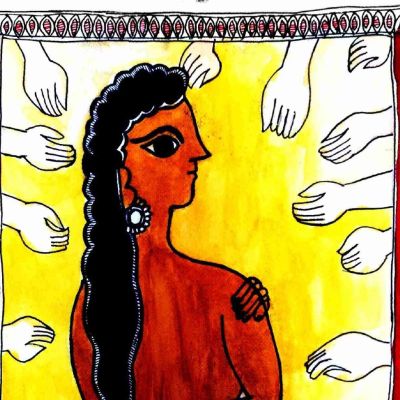Boundaries
There are times when we bend the rules and draw on the walls. This is one of those times. We listened in on some of the chatter online on the subject of consent and we ended up with some questions.
Aastha Khanna is India’s first intimacy coordinator who is making sure that a film’s vision is realised without flouting anyone’s boundaries, or leading to general awkwardness on set, especially when it comes to intimate scenes.
Women’s bodies are considered as symbols of izzat and abru (honour and dignity) making it the woman’s responsibility to ‘protect’ her sexuality, while at the same time, her sexuality is controlled by patriarchs.
Connection, to my mind, is one of those profoundly entrenched concepts manifesting itself throughout our lives. It is difficult to let go of.
This issue of In Plainspeak while inviting us to embrace the joys and pleasure in movement, also questions the ways in which movements are facilitated or obstructed, visibilised or invisibilised, and the spaces that we must envision to find freedom in/to movement.
My self-care journey has only just begun and I have a long way to go. I do have bouts of self-doubt, anxiety, and panic, and I still go through periods of feeling overwhelmed. However, more than anything, I have learnt that self-care, for me, is a subversive act, and caring for myself gives me the strength to challenge the status quo and play my part in social justice movements.
In the middle of this pandemic, can one seek sexual support in the form of a hook up with one’s best friend, ‘just because’? Is it redefining boundaries, is it sympathy sex, is it simple indulgence, or is it something that one or both might later resent?
From maintaining safety to the maintaining of boundaries, privacy plays a crucial role in informing our sexuality and preserving our sexual wellbeing
This article is based on our research work in the two resettlement colonies of Dakshinpuri and Sanjay Camp, located in…
यूँ तो विवाह और उससे जुड़े महिलाओं के ‘स्थान परिवर्तन’ को ‘प्रवसन’ का दर्ज़ा दिया ही नहीं जाता है, इसको एक अपरिहार्य व्यवस्था की तरह देखा जाता है जिसमें पत्नी का स्थान पति के साथ ही है, चाहे वो जहाँ भी जाए। पूर्वी एशियाई देशों में, १९८० के दशक के बाद से एक बड़ी संख्या में महिलाओं के विवाह पश्चात् प्रवसन का चलन देखा गया है जिन्हें ‘फॉरेन ब्राइड’ या विदेशी वधु के नाम से जाना जाता है।










